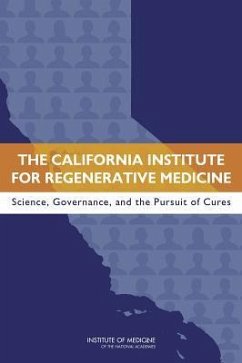The California Institute for Regenerative Medicine (CIRM) was created in 2005 by The California Stem Cell Research and Cures Act (Proposition 71) to distribute $3 billion in state funds for stem cell research. The passage of Proposition 71 by the voters of California occurred at a time when federal funding for research involving human embryonic stem cells was uncertain, given the ethical questions raised by such research. During its initial period of operations, CIRM has successfully and thoughtfully provided more than $1.3 billion in awards to 59 California institutions, consistent with its stated mission. As it transitions to a broadened portfolio of grants to stimulate progress toward its translational goals, the Institute should obtain cohesive, longitudinal, and integrated advice; restructure its grant application review process; and enhance industry epresentation in aspects of its operations. CIRM's unique governance structure, while seful in its initial stages, might diminish its effectiveness moving forward. The California Institute for Regenerative Medicine: Science, Governance, and the Pursuit of Cures recommends specific steps to enhance CIRM's organization and management, as well as its scientific policies and processes, as it transitions to the critical next stages of its research and development program.
Hinweis: Dieser Artikel kann nur an eine deutsche Lieferadresse ausgeliefert werden.
Hinweis: Dieser Artikel kann nur an eine deutsche Lieferadresse ausgeliefert werden.








